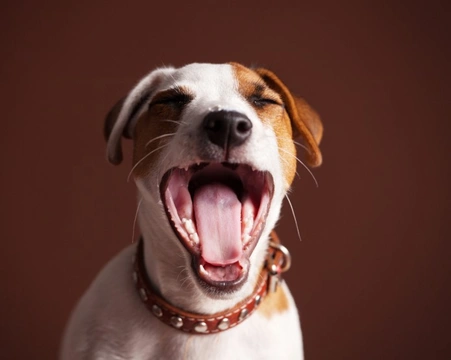Pets
Pets for studWanted petsBreedersAccessories & services
Knowledge hub
Support
Support & safety portal
Halitosis in dogs: Understanding the causes of bad breath
Few dogs have pleasant, minty fresh breath, but it is a very common misconception that foul breath is a normal state for dogs, and is just something that must be tolerated. As is the case with people, bad dentition, broken or rotting teeth, sore and damaged gums and other dental problems are the most common causes of bad breath in dogs, but this is not the only potential culprit, although it is certainly the one to rule out first!
In this article, we will look at some of the most common causes of halitosis or foul breath in dogs, and how to deal with them. Read on to learn more.
Halitosis in dogs is not normal
First of all as we mentioned above, halitosis is not normal for dogs, and allowing your dog’s bad breath to go unremarked or unmanaged is doing your dog a disservice, which may well contribute to or actually cause more serious problems.
Up close, your dog’s breath will usually smell slightly of their food or whatever they ate last, but this smell should not be foul or very strong, and you should not be able to smell it from more than a few inches away.
If your dog’s bad breath is apparent just by patting them, or if their coat too smells horrible due to their grooming of it, this is a problem, and not one that you can afford to ignore!
Dental problems
The most common cause of halitosis in dogs is poor dentition, and again it is important to reiterate that this is not acceptable or normal! It is wise to brush your dog’s teeth a couple of times a week and to get your dog used to this and into the habit of it while they are still young, and will be more accepting of the intrusion!
However, dogs that have not had good dental care will usually begin to show the signs of tooth decay and sore gums by the time they reach seven or eight years old, at which point your vet will usually recommend a sedated dental procedure, to allow them to deep clean the teeth and deal with any problems.
This should in turn sort out the halitosis problem!
Dehydration
A dog that is not drinking enough water will develop bad breath too, and dehydration is the second most common cause of halitosis in dogs. If your dog’s breath is sometimes pretty foul and it is not related to something fragrant that they just ate and it tends to come and go, make sure that they are drinking enough.
Foul food
Dogs are rarely very discerning about what they eat, and will often scavenge when out walking and pick up all manner or nasty things, sometimes eating roadkill, poop from other animals, and other unpalatable offerings!
If your dog has eaten something nasty, their breath may smell bad afterwards, and for some hours longer while it works its way through their system!
A poor quality diet
If your dog’s diet is not the right fit for them or is not of a good quality, this can affect their breath too. Again, this is not restricted to when they have just eaten, but while the food is working its way through their system too.
Changing to a better quality food or something more appropriate for your dog will usually resolve the problem within a week or two.
Food allergies
Food allergies and intolerances in dogs can cause bad breath too, because they will irritate the stomach and may lead to diarrhoea, stomach upsets and other issues with the digestive tract.
Anything that is not quite right with the dog’s digestive tract can cause bad breath, so if you are seeing other indications of a potential sensitivity or problem with your dog’s ability to eat a general commercial diet, you may need to make adjustments.
If feeding your dog a hypoallergenic food or something designed to suit dogs with sensitivities is the answer, your dog’s breath should improve within a week or two once again.
Diabetes
Undiagnosed diabetes is something that can cause an unusual smell to the dog’s breath, which may be very strong.
This is due to a process called ketosis, which occurs when the body is unable to convert food into energy, due to a deficiency of insulin. In its place, the body will begin to burn its own fat stores, which of course leads to weight loss, and the signature smell that comes with it.
The smell of ketosis breath is usually rather sweet with a tinge of decay, like rotting fruit, but can vary from case to case.
Getting a proper diagnosis for your dog and beginning a management regime will soon resolve the issue, and the associated health problems that diabetes can cause.
Other health issues
As mentioned earlier on, anything that causes a stomach upset or problem within the digestive tract can lead to halitosis, but there are other health conditions that can lead to bad breath too, and this is sometimes an important diagnostic tool for your vet, so do not ignore it!
Kidney and liver conditions are just a couple of things that can change the smell of your dog’s breath, so if you cannot work out why your dog’s breath is bad, ask your vet to give them a check-up and maybe run some tests.



